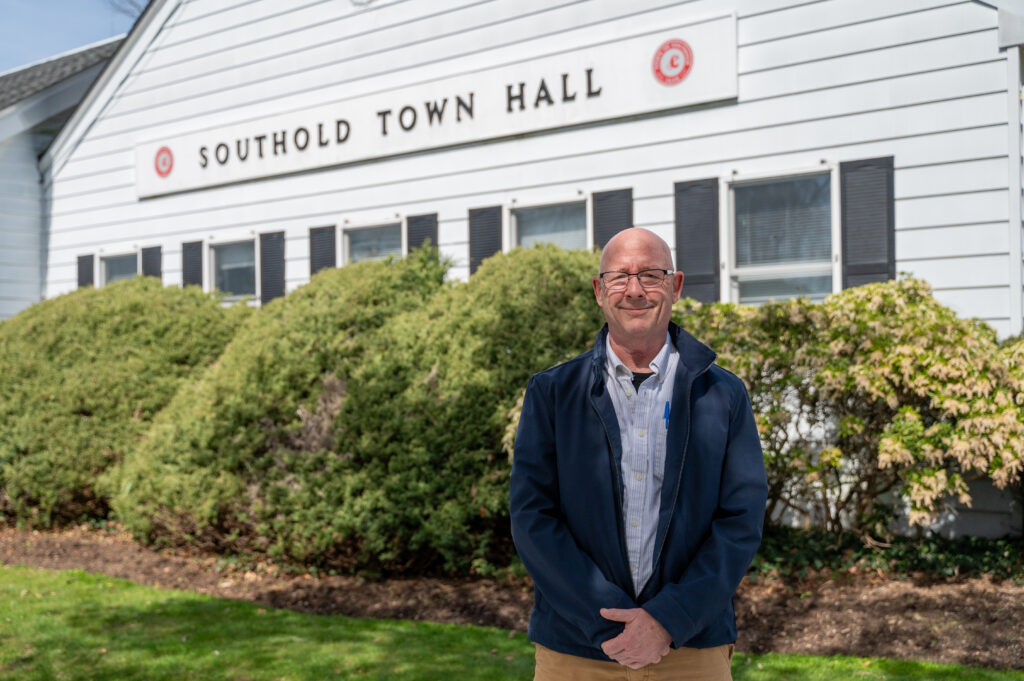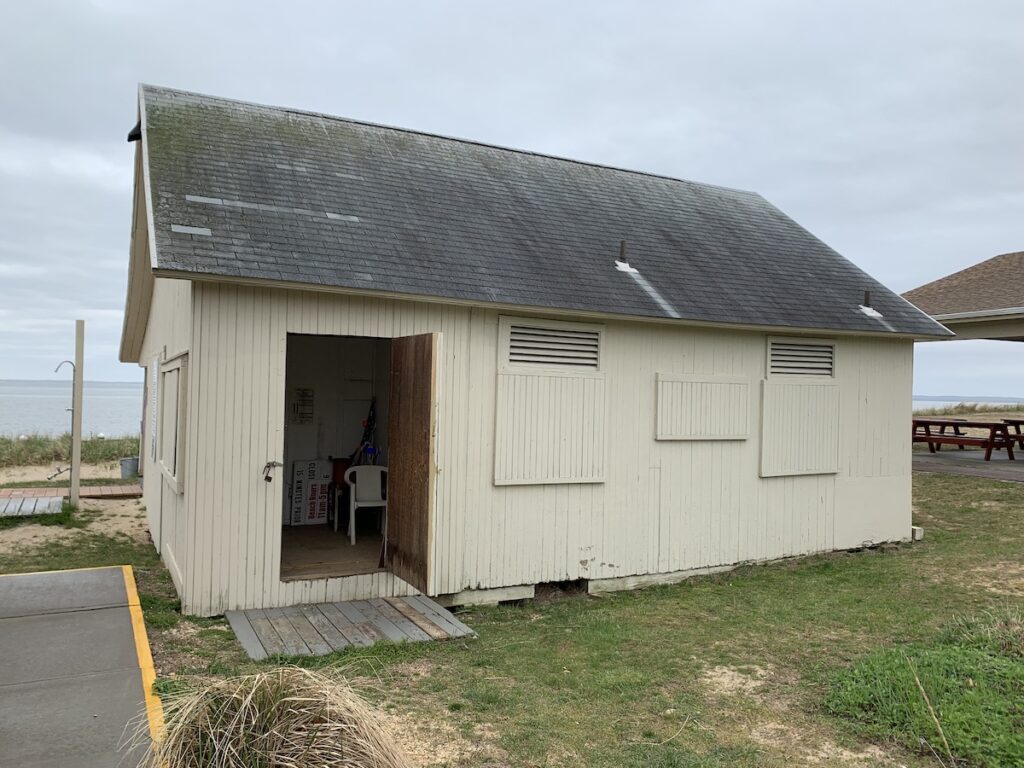Ukrainian family finds shelter in Mattituck

On Feb. 24, 2022, Lilya and her husband, Maryan, left their home in western Ukraine to drive to work. It was no ordinary morning.
Their hometown is 12 miles from the Polish border and on this day, the first day of Russia’s all-out war against Ukraine, they could see miles upon miles of cars whose passengers wanted to cross the border to safety.
The line of cars extended from the border to their hometown. Families were also on foot — men, women and children carrying what they could in the hope of escaping the conflict, which was only just starting.
None of the refugees could have imagined that, 19 months later, their country would still be at war, entire cities and towns would be piles of rubble, schools and hospitals would be destroyed, and tens of thousands of their soldiers would be killed or wounded. With no end in sight to the war.
On Monday, Labor Day, Maryan, Lilya and their 11-year-old son, Matvii, were safe at a home in Mattituck where they’ve been guests of Christopher and Denise Magyar since May, when they arrived from Ukraine.
The Magyars met the couple through their Riverhead church, St. John the Baptist Ukrainian Catholic Church. Led by the Rev. Bohdan Hedz, the church is the spiritual home of the Ukrainian community on the North Fork, which has grown steadily since the war began.
The couple, who asked that their last name not be used, sat at the kitchen table in the Magyars’ home, Matvii perched on a chair next to his mother. They do not speak English. Translation was provided by the Magyars’ friend Irene Andreadis. It was a lovely late summer morning. Beyond the back yard, a bright sun shimmered on the robin’s-egg-blue waters of Long Island Sound.
“We are very glad to help them,” said Denise Magyar. “They have been through so much. Here, they can be together.”
This week, Matvii will begin school at Cutchogue East Elementary, where a translator will help him with classwork. There are Ukrainian refugees in nearly all North Fork schools, including Oysterponds Elementary in Orient.
The couple’s story is one of war, escaping from war, reaching out to a Ukrainian friend who lived in Riverhead for help finding a temporary home and yearning to return to their homeland. Theirs is also a story of the Magyars’ kindness in offering them a place to live until it is safe for them to go home.
Lilya’s eyes flood with tears when she speaks about leaving their 18-year-old daughter, Angelina, behind in Ukraine.
“She didn’t want to leave, didn’t want to leave her country,” she says through the translator. “We begged her. She felt strongly about staying and we respected her opinion.”
On the day they left their home, Angelina drove them to the Polish border, where they caught a bus for Warsaw and then a flight to New York. Asked how hard it was to leave their daughter and their country, Lilya said, “Very, very hard. Horribly hard.”
Maryan, seated next to his wife, nodded in agreement. “Yes, very, very hard,” he said, holding his emotions in check.
They speak with Angelina every day, and follow news from Ukraine on various websites. The war in their home country is the backdrop to their daily lives here. Through the translator, Lilya said “The war has touched every single family in Ukraine. Brothers, sisters, fathers — everyone has been touched by this war.”
This family, too. On July 29, word reached Lilya that her first cousin Oleh, the 30-year-old father of three young children, was killed near Bakhmut during a Russian artillery barrage. Lilya’s eyes tear up as she tells about Oleh’s mother, who was hospitalized over the horror of her son being deployed to fight the Russians, and then killed. She was still in the hospital on the day of his military funeral and could not attend.
Through the translator, this is the family’s story:
On that first day of the Russian attack, they heard on the radio what was going on. They were stunned. They didn’t believe it was happening until they saw the chaos in the streets, and people fleeing toward the Polish border.
“They did not believe it would come to this,” the translator said as she went back and forth with the couple for the benefit of a visitor. “They believed they were living in an independent country and they didn’t expect a neighbor to invade.”
Halfway to work, they turned around and returned home. Everywhere people were in flight. People brought food to the long lines. Back at the house, the couple turned off all the lights. They would stay in darkness.
As the fighting progressed, they were safer in the western part of the country. But not completely. Maryan shows a visitor a video on his phone of Russian rockets flying across the sky near the family home, destined for a Ukrainian military base not far away.
They knew they had to get their family to safety. Programs offered by the Biden administration sped up the visa process specifically for Ukrainians, and they began to plan ways to get to Riverhead, where Lilya’s friend had gone soon after the war started and could help them find a place to live.
Weeks went by. Finally, on that sad day in May, Angelina drove her parents and brother to the Polish border. Saying goodbye to their daughter, knowing she was staying behind in a country under attack, ripped their hearts out.
The Magyars teach English to Ukrainians at their Riverhead church. They heard about a family that needed a place to stay and, when a home could not be found, volunteered to be hosts.
It made sense to them. Denise Magyar is a second-generation Ukrainian, whose grandparents came to America early in the 20th century. She knows Ukrainian history — a numbing list of wars, occupations and mass starvations — so helping Lilya and her family came naturally.
Between Feb. 24 and May 8, bombs landed near their hometown almost daily. One time, when Matvii was home alone, the bombing came close enough to shatter windows in their neighborhood.
“It was constant,” Maryan said through the translator.
When Ukrainian defenses intercepted incoming rockets, debris fell to the ground around their home. There was no question about leaving.
“Lilya is saying the situation was absolutely horrific,” the translator said. “It was so hard because their daughter did not want to leave.”
Leaving the country — both sets of the couple’s grandparents had endured the German occupation during World War II and then decades of Russian occupation — was made all the worse because they never expected their lives would go in this direction. In Ukraine, history is a tragedy that repeats itself.
Quoting Maryan, the translator said: “I still can’t believe this has happened. We pray to God to let us see each other soon and that this war will end. Everyone in Ukraine is in shock that this is happening again.”
Despite the wholesale destruction of their country, the mother, father and son all say they will go back to Ukraine.
“They said they will go back when this is over,” the translator said. “They want a victory as soon as possible to minimize the death and destruction. Lilya says she doesn’t want her children to go through this. Her son misses his sister very much. He is very worried about her.”
Several times during an afternoon interview, the couple thanked the Magyars for their kindness. Both Lilya and Maryan said they are grateful to them, but also to America for coming to Ukraine’s aid.
The translator summed up what Lilya said: “She is totally in shock that people would accept her family into their home. She said Americans are very good people.”








